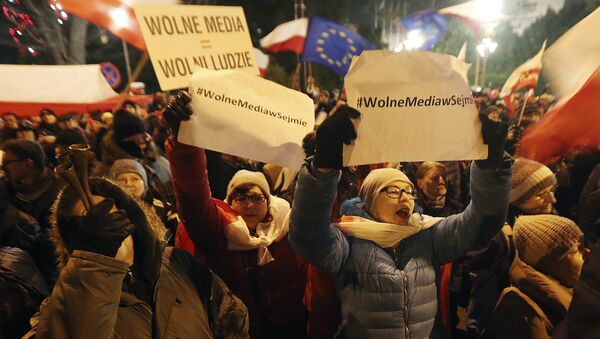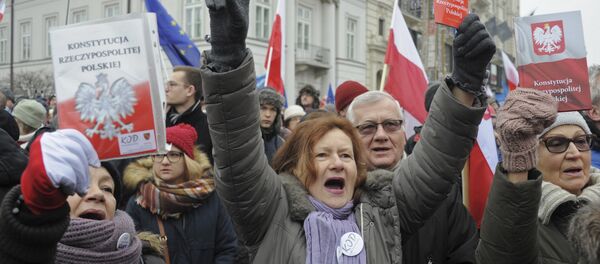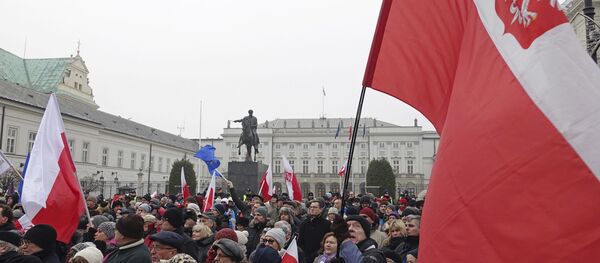Poland's ruling Law and Justice Party (PiS) government, besieged by pressure from domestic opposition and EU officials over a series of controversial legal reforms introduced last year, is facing a new crisis, this time over its decision to limit the number of journalists given accreditation to cover sessions of the country's parliament, the Sejm.
The government says the restrictions, which are expected to step into force next year, are meant to ensure the Sejm's security. Opposition parties disagree. This disagreement has led to a tense standoff, eventually including protests in the streets of Warsaw and other Polish cities, and even calls for Brussels to 'do something' about the government's 'illegal actions'.
The opposition called the vote illegal, and refused to recognize the session. Civic Platform leader Grzegorz Schetyna called what happened "a violation of parliamentary democracy." For his part, Ryszard Petru, leader of the opposition Modern Party, told Polish media that the ruling party's' behavior was "shameless," adding that the PiS had effectively "lost its legitimacy."
The government's actions have led to protests, first outside the parliament and the presidential palace, and then outside PiS offices in other cities across Poland. The protests, led by Civic Platform, were soon joined by the Committee for the Defense of Democracy (KOD), a pro-EU civic organization created last year to protest what it considered anti-democratic reforms by the government.
Surrounding the Sejm on Friday, protesters effectively blocked PiS MPs from leaving the building. On Saturday, the crisis escalated as protesters clashed with police outside parliament while Law and Justice politicians including Prime Minister Beata Szydlo and PiS leader Jaroslaw Kaczynski left the building, heavily escorted by security. Police resorted to using tear gas, a measure opposition Modern Party MP Jerzy Meysztowicz called "unacceptable."
Kaczynski has requested Polish Senate Speaker Stanislaw Karczewski to organize a meeting with media representatives Sunday to try and iron out the situation.
But opposition lawmakers don't appear ready to concede following Friday's political maneuver and Saturday's clashes. Speaking to Polish media, Ryszard Petru stressed that "what happened in the Sejm does not comply with the Constitution. It is illegal. There was no quorum, no counting system, no media. We will appeal to the prosecutor." Left politician and activist Barbara Nowacka added that the country's opposition will have to unite and work together to "counteract the trampling of democracy."
For his part, Civic Platform lawmaker Stefan Niesiolowski told Sputnik that the whole affair may even lead the EU to take some kind of 'indirect action' against Warsaw to "restore democracy" to Poland. Speaking to the news agency on Saturday, the politician complained that Poland is already seen as the "sick man of Europe", with the latest scandal likely only to strengthen Brussels' displeasure over the political situation in the country.
Niesiolowski suggested that PiS leader Jaroslaw Kaczynski's tactics were already "reminiscent of those of the Communists — never to admit his mistakes, to push forward with everything, and to rely on society being exhausted" and demoralized. However, "these kinds of tactics will not bring success," the politician stressed. "He will lose just like the communists lost."
But other observers say that the ruling party is unlikely to be swayed to change their policies or ruling style, either by protests or by pressures from Brussels. Commenting on the scandal, Sputnik Poland suggested that Kaczynski's political strategy has long been one of appeasing supporters while speaking to opponents in the language of hostility. The government has sufficient political support to push its initiatives forward, and can rely on many ordinary Poles' stubborn resistance, particularly to pressures from abroad. The news agency pointed to the case around the Constitutional Tribunal, where Warsaw simply ignored EU directives, as well as local media and opposition protests, over changes to the laws governing the functioning of the country's constitutional court.
In any case, ex-MP and political commentator Tadeusz Iwinski told Sputnik Poland that the political atmosphere in the country is now tense, with the scandal around the PiS's restrictive media measures perhaps "the last straw" in creating a "parliamentary and political crisis that will be difficult to resolve."





